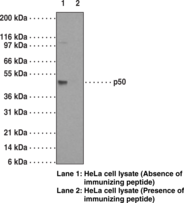| Formulation |
100 µg of protein G-purified IgG in 200 µl PBS containing 0.2% gelatin and 0.05% sodium azide |
| Stability |
1 year |
| Storage |
-20°C |
| Shipping |
Wet ice
in continental US; may vary elsewhere
|
| Specificity |
|
| Size |
Global Purchasing |
| 1 ea |
|
Description
Antigen:
a portion of amino acids 150-200 of human NF-κB (p50)
·
Clone designation:
2J10D7
·
Isotype:
IgG1κ
·
Application(s):
IHC and WB
·
NF-κB is a transcription factor activated by various extra and intracellular stimuli such as cytokines, UV radiation, stress, injury, and by bacterial and viral products. It is involved in regulation of various cellular events including cell growth, differentiation, proliferation, apoptosis, and inflammation. NF-κB1 (p50), a 50 kDa functional sub-unit of NF-κB, is a member of the Rel protein family. It is synthesized as a p105 precursor protein and consists of an N-terminal conserved RHD-region containing a nuclear localization signal, DNA-binding and dimerization domains. NF-κB (p50) forms homodimers or heterodimerizes with p65, forming the functional NF-κB factor. NF-κB (p50) directs the nuclear translocation of NF-κB and is instrumental in its DNA-binding. A pathological role of NF-κB has been suggested in AIDS, hematogenic cancer cell metastasis, and rheumatoid arthritis.






